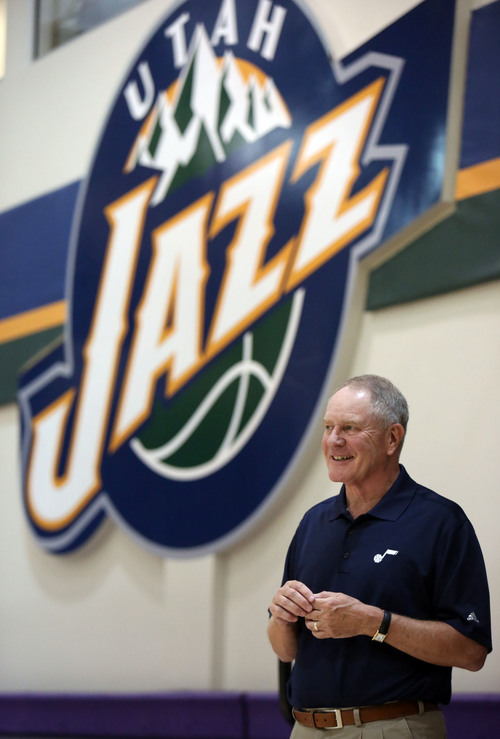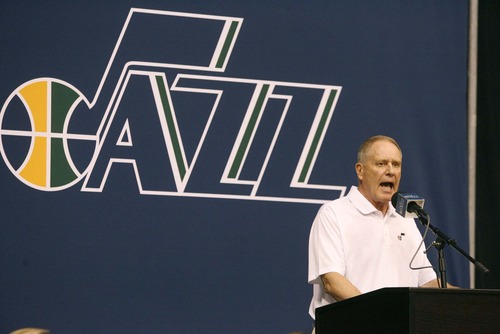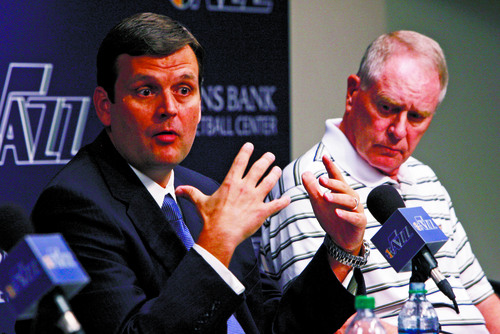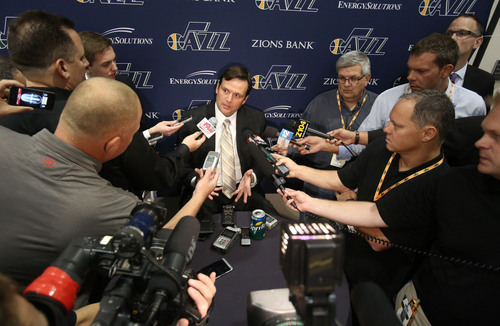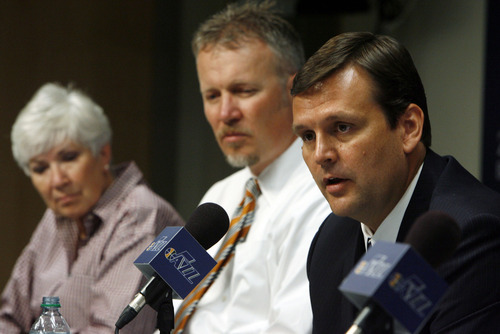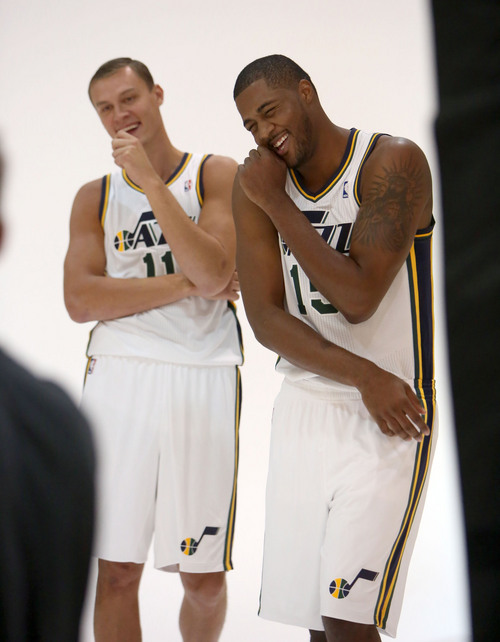This is an archived article that was published on sltrib.com in 2013, and information in the article may be outdated. It is provided only for personal research purposes and may not be reprinted.
When Feb. 21 came and the NBA's midseason trade deadline passed and Paul Millsap, Al Jefferson and everyone else remained on the Jazz roster, many around the NBA scratched their heads. Here were the Jazz, fighting for a playoff spot but still far from the top of the Western Conference, sitting on a gold mine of NBA contracts in the form of talented big men Al Jefferson and Paul Millsap.
And they were just … sitting on them?
"We didn't go out and trade Al and Paul," said Kevin O'Connor, the Jazz's executive vice president of basketball operations. "We wanted to see what that team could do a little bit, but we also, as we snooped around, there wasn't a big market for those two — enough to say, OK, let's do it."
When the Jazz take the floor for the first time in the regular season on Wednesday, they will bear the marks of a team that let seven key free agents walk in summer; one that smiled politely as its two leading scorers signed big-money deals elsewhere.
It's a bold approach to rebuilding, one that places enhanced pressures on young players Gordon Hayward, Enes Kanter, Derrick Favors, Alec Burks and Trey Burke.
Asked if the league is watching the Jazz's strategy, O'Connor said, "If it works, I think they'll really like it. It's a copycat league."
Just like anything else, the Jazz's strategy, the one that brought them to what general manger Dennis Lindsey calls a "season of discovery," is based on intense study of what other teams have done. How they have succeeded and failed. The truth of this Utah rebuild lay deep in filing cabinets in the Jazz front offices, on memos where O'Connor and his cohorts drew up long-term plans before Deron Williams left, before Jerry Sloan resigned and, certainly, well before he returned as an adviser.
In 2010, the Jazz feared Williams would leave two summers later as a free agent. The NBA had been pocked by players making their careers in smaller markets and then skipping town: LeBron James had done it in Cleveland, so had Chris Bosh (Toronto) and Amare Stoudemire (Phoenix). Carmelo Anthony was about to do it in Denver.
So the Jazz brain trust sat down and built a list of what they would consider in a trade for Williams. The answer had been dictated by the big move they'd made the summer before.
"We said we have to get young assets, draft picks and some relief so that no contract could go beyond Al and Paul," O'Connor said earlier this month.
When the Jazz acquired Jefferson in an offseason trade to replace the post scoring of Carlos Boozer, they did so with more of an eye toward his contract than his ability on the left block. The franchise made a fundamental decision to not take on contracts that went longer than 2013, when Paul Millsap's deal expired.
So, when the time came to deal Williams, which the Jazz did in the early hours of a February game day, they went back to three requirements of any deal: draft picks (Kanter, Burke), young assets (Favors) and cap relief (Devin Harris).
The only deviation from that plan came last summer, when the Jazz flipped Harris to Atlanta for Marvin Williams, whose contract expires next summer.
The Jazz also lucked out in that deal by receiving pieces that would make up three-fifths of their much ballyhooed core. Favors had been New Jersey's draft pick the year before, Kanter was selected with the pick the Nets shipped to the Jazz, and Burke, the No. 9 overall pick in this summer's draft, was acquired thanks to yet another pick the Nets threw into the deal.
"I think it was a decision that had a lot of forethought to it," Lindsey said of the deal, "and now we're starting to see some of the fruits from that; that seed that was planted into the ground. And as the young players are growing, we needed to create more opportunity for them and really discover where we're at now so we can move forward intelligently."
Last season the Jazz faced a crossroad: If the team was good, the organization could be inspired to build around a core of Jefferson, Millsap and select young players. Other young assets could have taken on value around the league. Instead, the team flopped down the stretch, finishing 43-39 and missing the playoffs.
The core was blown apart, although not as dramatically as such verbiage suggests. The highest-paid players simply walked away, and the Jazz invested — emotionally, if not yet financially — in the beginnings of a new core. No one has yet to suggest the Jazz have the primary pieces to build a championship team. If the Jazz struggle as much as most expect, June's draft will yield a high draft pick, as well as a second first rounder acquired from the Golden State Warriors in July's salary move that brought Richard Jefferson, Brandon Rush and Andris Biedrins to Utah.
Whether that manifests itself in the form of Andrew Wiggins or Julian Randle or something else entirely, it will fall in line with a long-term plan. And not short-term scrambling.
Twitter: @bill_oram Jazz rebuild timeline
Feb. 10, 2011 • Coach Jerry Sloan and assistant Phil Johnson resign; Tyrone Corbin named head coach.
Feb. 23, 2011 • Acquired Derrick Favors, Devin Harris and two first-round draft picks from New Jersey for Deron Williams.
March 1, 2011 • Signed Corbin to a three-year contract.
June 23, 2011 • Selected Enes Kanter (No. 3) and Alec Burks (No. 12) in the NBA draft.
June 29, 2011 • Exercised the option on the contracts for Gordon Hayward and Favors.
Dec. 11, 2011 • Acquired a trade exception and second-round draft pick from New Jersey for Memo Okur.
June 28, 2012 • Selected Kevin Murphy (No. 47) in the NBA Draft.
June 29, 2012 • Acquired Mo Williams from the Los Angeles Clippers as part of a four-team trade.
July 11, 2012 • Acquired Marvin Williams from Atlanta for Harris; re-signed Jeremy Evans.
July 26, 2012 • Signed free agent Randy Foye.
Aug. 7, 2012 • Named Dennis Lindsey general manager.
June 27, 2013 • Acquired the draft rights to Trey Burke from Minnesota for two future first-round picks; acquired Rudy Gobert from Denver for the 46th pick in the draft and cash.
July 1, 2013 • Al Jefferson, Paul Millsap, Mo Williams, DeMarre Carroll, Jamaal Tinsley and Earl Watson become free agents.
July 10, 2013 • Acquired Andris Biedrins, Richard Jefferson, Brandon Rush, two first-round picks, two second-round picks and cash from Golden State for Kevin Murphy; signed Randy Foye and traded him to Denver for a second-round pick as part of the same three-team trade.
July 22, 2013 • Signed free agent John Lucas III.
July 29, 2013 • Signed free agent Ian Clark.
Oct. 19, 2013 • Signed Derrick Favors to a four-year, $49 million contract extension.
Oct. 26, 2013 • Signed free agent Jamaal Tinsley.


